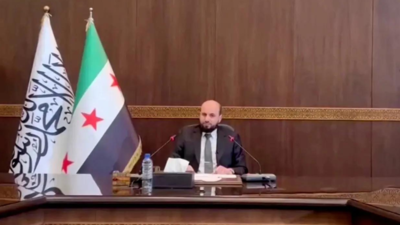
The rebels on Tuesday appointed Mohamed al-Bashir as Syria’s caretake prime minister after they toppled Assad’s government. He in a statement broadcasted on television said that he will continue to be in this role until March 1, 2025.
He has called for peace and order in the nation following his appointment. “Now it is time for this people to enjoy stability and calm,” said Bashir in an interview.
Bashir had earlier served as the head of the rebel administration’s “Salvation Government” in Syria’s Idlib, having previously held the position of “development minister”.
This administration, established in 2017, operated its own ministries, departments, and authorities to support residents disconnected from government services.
The engineering graduate in his early forties faces the task of governing a nation fractured by 13 years of conflict from Damascus, the traditional centre of power.
Born in 1983 in Idlib province’s Jabal al-Zawiya, an area predominantly controlled by Hayat Tahrir al-Sham (HTS) and allied groups, Bashir completed his education at Aleppo and Idlib universities, studying engineering and law respectively, and previously worked for Syria’s state gas company.
Following the rebels’ successful offensive beginning November 27, which resulted in the capture of significant territory including Aleppo and the capital, the administration has expanded its support services. However, governing a nation of divided populations presents significantly greater challenges than managing a rebel region of five million people.
Various groups are competing for influence in former government strongholds, adding to the complexity of the situation. Abu Mohammed al-Jolani acknowledged to the outgoing prime minister that despite Idlib’s limitations, its authorities possess valuable experience, while emphasising the need to retain expertise from the previous administration.
Bashir made his first appearance outside Idlib in a video released Monday, dressed formally and meeting with Jolani and the outgoing premier. Radwan Ziadeh, from the Arab Center Washington DC, identified Bashir as closely aligned with Jolani and the rebel command structure, whilst acknowledging the significant challenges ahead.
“Just as the revolution was a revolution for all Syrians, the transitional process will be the responsibility of all Syrians in order to ensure it succeeds and guarantees the peaceful transition to democracy,” he stated.






